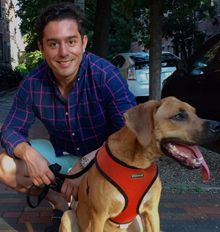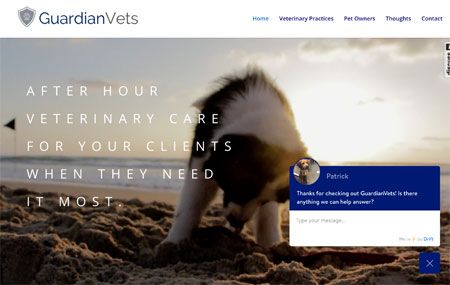New service promises an antidote for late-night client calls
GuardianVets promises that after-hours pet triage with licensed veterinary professionals will bond clients to your practice.

shutterstock.com“Hello?” you croak, rubbing the sleep from your eyes.
“Max is sick. I can't get him to eat.” The voice on the other end of the phone is husky with tears. Your client speaks fast and low, a cadence of fear laced with panic. “Does he need to be seen?”
You've taken countless calls like this one. They're inevitably on an evening or weekend, after the clinic is closed. But now you've answered the phone, and so you face the Sophie's choice of veterinary medicine: Crawl out of bed as you tell the client you'll see her and Max at the clinic in 20 minutes … or send her to the emergency hospital, where she'll discover that an emergency call is a little more expensive than a daytime appointment with you. Plus, she'll likely be mad at (a) you for referring her, (b) the emergency hospital for charging her for its expertise and overhead-or, most likely, (c) all of the above.
Yeah, totally what you dreamed you'd be doing with your life when you were 6 years old.
Enter John Dillon. He's not a veterinarian. He used to work in finance as an investment banker, but don't hold that against him. His life changed about a year and a half ago when he adopted Patrick, a boxer bloodhound rescue pooch he found on Petfinder.
“He changed everything for me,” Dillon says. And he does mean everything. Like where he lives and what he does for a living. Patrick is the reason Dillon launched GuardianVets, a veterinary triage service that offers after-hours coverage for veterinary practices and their clients in the Midwest. Here's how it all unfolded. (P.S. We know what you're thinking. Telemedicine! He can't get away with this! Wait. Read on, and we'll explain what his service is-and isn't.)
An energetic bundle of trouble

John Dillon is totally the kind of guy who has a picture of himself with his dog on his cell phone. C'mon, you know that's cute! It began two weeks after Dillon adopted Patrick. After a day of romping at the park, Patrick collapsed on the couch, groaning.
Dillon freaked. Was he sick? Did he eat something?
“A million things were going through my head,” Dillon says. “My veterinarian was closed, so I called the emergency clinic. Of course, they only tell you that if you think it's an emergency, you need to come in.”
Dillon ended up at the emergency hospital. And it turned out Patrick was just tired.
“The second time, he's chewing on a pig's ear and he swallows it. So now I'm thinking, is this gonna get stuck in his intestinal tract? Are they gonna have to cut him open if I wait? Is it easier if I have him regurgitate it now?” Dillon says.
So again Dillon took Patrick to the emergency hospital. And again he was completely fine.
The third time, on a Saturday trip to the dog park, Patrick was running full speed ahead with a pack of dogs and slammed into a fence.
“And he starts limping,” Dillon says. “One of the other pet owners says, ‘Well there goes your first ACL injury.' Can you imagine? Someone plants that into your head like a stick of dynamite.”
Dillon quickly noticed a trend in his experiences. These unexpected events all happened on evenings and weekends, when his regular veterinarian was closed. And when he called an emergency practice, the message was the same:
“If you think it's an emergency, you need to come in.”
In each of these circumstances, Patrick was fine. But the experience made Dillon wonder if there was someone who could help him assess whether his pet was experiencing a true emergency-and avoid the cost of an emergency visit if his pet didn't need immediate care. What he wanted: the ability to talk to a veterinarian to help him make the right decision about when to seek treatment for his pet immediately–and when he should wait instead and take his pet in during the veterinarian's regular business hours.
Tele-triage, explained
Some practices try to offer round-the-clock ability to talk to a veterinarian-but this can mean the doctors are essentially always on call. Dillon's goal: to offer the service of an on-call veterinarian to benefit pet owners-and offer relief for veterinarians who need time off.
Dillon says he's received an amazing response to his service-particularly from spouses of veterinarians.
“I've been very careful to work in conjunction with the veterinary community on how to build this up properly. For example, there are a lot of other companies that try to do basically telemedicine. And we stay away from that,” he says.
Dillon says his company practices triage, not telemedicine. The key difference: GuardianVets does not offer diagnosis or treatment.
Here's how the service works: Say a client calls you after your clinic is closed. Instead of voicemail or an answering service, a veterinarian answers your phone. In the course of what is often a five- to 10-minute phone call, the doctor takes a history and uses rule-outs to determine whether the pet is experiencing an emergency that requires immediate attention at an emergency facility or if it should be seen at its regular veterinary hospital the next day.
“Because pet owners have to go through their vet practice to reach us, we're able to bond the client more closely to their primary practice. And if the issue isn't emergent, then we'll help them schedule an appointment for the next business day,” Dillon says.

When you visit the GuardianVets site, Patrick greets you to answer any questions.
An alternative to Dr. Google?
John Dillon would love to help you solve your Dr. Google problem.
His premise? GuardianVets keeps pet owners from Googling medical questions, asking their friends on Facebook or taking anecdotal advice from their uncle. Instead, Dillon says, with his service, pet owners speak to a licensed professional who can determine whether it's an emergency instead of having clients diagnose their pets alone at home.
“The industry can chastise Dr. Google all we want, but we need to offer an alternative,” Dillon says. “With this service we're saying that for any medical issue, you need to call your doctor. Veterinarians don't often think about how many customer touchpoints they have per month. When you post something on social media, how do you measure its success? It's engagement. It's a relationship. It's talking.”
Dillon maintains that by using GuardianVets services, client engagement goes up, which translates into more appointments. “Not just existing clients but new clients because you're advertising as being available after hours,” Dillon says. “That's the power of being there for clients when they want it.”
But what does a DVM have to say?
Dear reader, we know what you're likely thinking right now: “This guy's not a veterinarian. What does he know about my business?” That's why we talked to the veterinary technician and veterinarians who advise Dillon and provide triage services for GuardianVets.
Meet Benjamin Bergstom, DVM, MS, DACVO. He's a veterinary ophthalmologist and executive advisor for GuardianVets, and he has a very particular reason for getting involved with this company. He says it addresses a pain point he feels too keenly.
“One of the worst things is coming in to see an emergency that probably could have waited until the following day, and the client just spent $300, and that was their paycheck for the week,” Dr. Bergstrom says. “It's a horrible feeling as a veterinarian.
“It's difficult to see people who want to do what's best for their pet, and that's why they're here. But if they could have had someone tell them that their pet could wait to be seen-that to me is one of the biggest things, and it's why I want to be involved in this.”
Katherine Donohue, DVM, the director of veterinary affairs for GuardianVets, says the service acts as a safety net for pet owners who are struggling to sort out their pet's signs-and it offers a feeling of control for pet owners in scary situations. “Clients are grateful to have a trained professional to run things by,” she says.
William Freeman, BS, LVMTg, the veterinary technician director for GuardianVets, agrees. “The biggest thing is getting to that client's concerns and addressing them,” Freeman says. “When you're dealing with a very concerned client with a nonemergent case, what they need more than anything else is just somebody to talk it out with. And a lot of times phone calls will start with clients who are on the verge of tears. Their voices are breaking. They're out of breath. And giving them the opportunity to be listened to is the best thing we can do.”
Currently only veterinarians talk to pet owners, but the company is beginning to use credentialed technicians to start screening calls. Dillon says the GuardianVets system doesn't yet integrate with things like video or medical records because developers are still trying to figure out how to responsibly implement those features into their triage model.
To that effect, Dillon's team of veterinarians is developing in-house triage protocols. They've presented their model to the AVMA board and are seeking to align their internal best practice standards to AAHA to make sure those protocols are at the highest level of medical excellence.
“Everything we've done has been from the veterinary perspective first,” Dillon says.
He says he plans to build machine learning into the GuardianVet protocols as well. And as the number of hospitals-and pet owners-they work with continues to grow, so will the data they collect, which will help them continue refining triage protocols over time.
“It's a level of information that I don't think the industry has had before,” Dillon says. “Over time, we'd like to integrate with the pet's medical records. This is happening in human healthcare already.”
Dillon points to the work Northwestern Memorial Hospital, an academic medical center in Chicago, has done with predictive analytics.
“If you're in the ER, they can look at your vitals in real time, and they have algorithms in place that help the doctors and nurses know if you're likely to go critical at any point in time, based on thousands of other records from thousands of other patients,” Dillon says.
Ultimately, Dillon hopes to use this information to create guidelines to offer better triage care and share them with the profession. He also plans to share case studies and recordings of GuardianVet calls with colleges of veterinary medicine to help train future veterinarians in triage.
But do you really need this service?
If you talk with Dillon, he'll likely make this case: You're probably spending time and money to market your practice, and you're not looking at the phone calls you're inadvertently turning away after hours. These are phone calls that could lead to appointments with clients who want to see you.
Most practices, he says, report that they get about one voicemail a day after hours. That's seven a week, and roughly 28 a month. “So if you have an average transaction charge of about $100 per client, that's $2,800 you're leaving on the table,” Dillon says. And, he adds, most people don't leave a voice message when they call-so the potential is actually much greater.
“Why are you spending so much money on outside marketing, when your clients are trying to reach you after hours?” he asks. “Those are customer touchpoints. You want to make sure your clients know they can reach your practice anytime, and you're not sending them anywhere else, unless it's an emergency and you're sending them to the ER.”
You've still got questions
Of course you do. Healthy skepticism is an awesome trait in a medical professional. So here's the part where we try to anticipate your biggest questions-and offer Dillon and his team a chance to try to satisfy your appetite for answers.
What does it cost?
GuardianVets is a monthly subscription service with a sliding fee scale based on the number of veterinarians at your practice. Dillon says the number of vets per practice gives him a good proxy for the demand for the service at a practice. You do not pay more if your clients use the service more, and once you've subscribed, the calls are free to your clients.
Who's answering my phone?
The company hires from a large pool of applicants and screens carefully for triage and soft skills, including the ability to offer a friendly greeting and take a solid history. Veterinarians have extensive experience in practice and specifically in an emergency setting.
GuardianVets has also built decision-support software that underpins the conversations they have with clients. But, Dillon says, they rely on professional experience of the veterinarian rather than the software.
Veterinarians who answer calls undergo extensive training on the ABCs of triage. Key issues must be sent to the ER, and they have policies for toxin ingestion that include immediately reaching out to pet poison control.
“Pet owners have the difficult job of communicating what they think is wrong with the pet and the vet has the super-difficult job of assessing the clinical signs,” Dillon says. “So there's a lot of training that goes on in the background, and we take that super seriously.”
Let's talk VCPR
Yes, let's. First, let's answer the big question. How can these veterinarians who are answering your phone possibly have a valid veterinarian-client-patient relationship (VCPR) with the pet and the pet owner? They don't. That's why they don't offer a diagnosis or treatment. Instead, their mission is to help pet owners answer one simple question:
“Is my pet experiencing an emergency?”
“It sounds kind of silly, but from a pet owner's perspective, that's all they want to know,” Dillon says. “They want to know, ‘Can I wait to go see a vet?'”
What will my clients think of this service?
“Clients are thrilled that they don't have to pay for this service provided by their practice,” Dillon says. If it's not an emergency, “they get to see their doctor as soon as it's convenient.”
If you're wondering whether your clients will use this service, Dillon says the practices he works with get more calls when clients realize they can call after hours. “And they may come in more often-more than once or twice a year,” Dillon says. “We're increasing touchpoints. It leads to happier pet owners, and the practice sees more appointments. So far, it's been a win-win.”
What are these vets telling my clients?
GuardianVets records all their calls-and provides them to you, along with write-ups of the calls. Dillon says in many cases the hospital's practice manager will listen to the calls each day. And GuardianVets will keep track of your practice's preferences and tailor them to you.
“We touch base with our practices to make sure we provide the information in a form that is usable to the practice,” Dr. Donohue says. “For transparency, we record everything.”
How do you handle clients who can't be calmed down?
“In the triage tree, if I've got a client who can't be calmed down, then they need to be seen,” Dr. Donohue says. “They're either seeing something that can't be verbalized or they need to have their pet assessed.”
Who's legally responsible for the actions of this after-hours veterinarian?
GuardianVets veterinarians take out their own personal liability insurance, and that follows them where they practice. “But the first line of defense is good customer service,” Dillon says. “Second is our triage protocols. Insurance is the last line of defense.”
How do GuardianVets doctors draw the line between what needs to be seen and what doesn't need to be seen?
“My answer is always that's a trick question. Because the answer is they always need to be seen. It's just a matter of how soon,” Dillon says. “We're not a substitute for a physical visit. If anything, we're going to bond the client more closely to you. If the pet needs to be seen right now, we're going to refer to the ER. The client's going to like the fact that you were there for them when they needed it. If it can wait, they're going to appreciate the fact that they can talk to someone.”
So what do you think? We know you've got more questions (and opinions, too). Email us at dvm360@ubm.com or share your comments below.
FDA approves oral drug for broad canine protection against parasites
October 7th 2024Elanco's lotilaner, moxidectin, praziquantel, and pyrantel chewable tablets (Credelio Quattro) provide a single monthly dose for protection against fleas, ticks, heartworms, roundworms, hookworms, and 3 species of tapeworm.
Read More
dvm360 announces winners of the Veterinary Heroes program
Published: September 6th 2024 | Updated: November 5th 2024This year’s event is supported by corporate sponsor Schwarzman Animal Medical Center and category sponsors Blue Buffalo Natural, MedVet, Banfield Pet Hospital, Thrive Pet Healthcare and PRN Pharmacal.
Read More